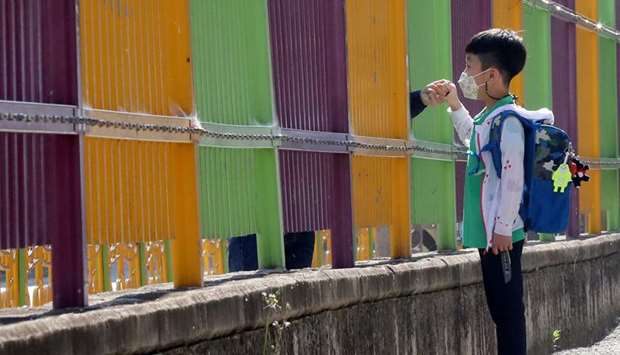South Korea yesterday imposed limits on the number of pupils going to schools in and around Seoul as officials scramble to tackle fresh coronavirus cases that threaten the country’s success in containing the epidemic.
Only one in three pupils at kindergartens, elementary and middle schools in the Seoul metropolitan area – home to half the population – will be allowed to physically attend school each day, authorities said, with the others remote learning.
And a total of 502 schools near locations linked to cases in the capital area will remain closed to all pupils, a ministry official told AFP.
Schools have been re-opening in phases in a process that is continuing nationwide. South Korea endured one of the worst early outbreaks of the disease outside mainland China, but appears to have brought it under control thanks to an extensive “trace, test and treat” programme while never imposing a compulsory lockdown.
Social distancing rules were relaxed and the country was returning largely to normal until this week, when it re-imposed some measures in the capital and the surrounding region following fresh clusters of cases.
The South on Thursday reported its biggest spike in new infections in nearly two months, but yesterday’s increase fell to 58, taking its total to 11,402.
An outbreak at a warehouse of e-commerce firm Coupang in Bucheon, west of Seoul, has seen a total of 96 cases as of yesterday, said the Central Disaster and Safety Countermeasure Headquarters.
“We have been advising Coupang employees and their family members” not to visit any schools, said vice education minister Park Baeg-beom.
Museums, parks and art galleries were closed again from yesterday for two weeks, while companies were urged to re-introduce flexible working.
South Korean health authorities said yesterday they would request imports of Gilead Sciences Inc’s anti-viral drug remdesivir to treat Covid-19, as new outbreaks of the disease flare as social distancing restrictions are eased. The Ministry of Food and Drug Safety must approve the import of the drug but a government panel concluded remdesivir showed positive results, Korea Centers for Disease Control and Prevention (KCDC) Director Jeong Eun-kyeong said.
Foster City, California-based Gilead has said the drug has improved outcomes for people suffering from the respiratory disease caused by the novel coronavirus and has provided data suggesting it works better when given in the early stages of infection. Preliminary results from a trial led by the US Institutes of Health showed remdesivir cut hospital stays by 31% compared with a placebo treatment, although it did not significantly improve survival.
Remdesivir, which previously failed as a treatment for Ebola, is designed to stop some viruses making copies of themselves inside infected cells.
After mounting an intensive campaign of tracing and testing to blunt an initial wave of coronavirus infections in February and March, South Korea has seen smaller but persistent outbreaks as it has lifted some social distancing restrictions in recent weeks.
The new spike in infections have been clustered in Seoul and the surrounding areas, raising concern that the densely populated capital city could see a wider outbreak. Those concerns prompted officials this week to close most government-run facilities like museums, galleries and theatres.

A boy holds his mother’s hands as he arrives at an elementary school amid the coronavirus disease outbreak in Gwangju, South Korea, yesterday.
